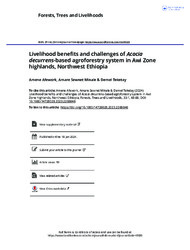Livelihood benefits and challenges of Acacia decurrens-based agroforestry system in Awi Zone highlands, Northwest Ethiopia.
Date
2024-01-18Author
Afework, Amene
Sewnet Minale, Amare
Demel, Teketay
Metadata
Show full item recordAbstract
Acacia decurrens (hereafter Acacia) agroforestry system has been expanding rapidly in the northwestern highlands of Ethiopia. The agroforestry system provides multiple eco-environmental services; however, there is inadequate quantitative evidence on its livelihood benefits. This study, therefore, investigated the livelihood benefits and challenges of Acacia-based agroforestry system in the Awi area, Northwest Ethiopia. Data was collected through household survey quetionnaires (296 randomly selected Acacia growers), focused-group discussions, interviews, and observations. A combination of quantitative and qualitative methods was used for the data analysis. The findings showed that crop production, charcoal making, animal rearing, and fuelwood selling were the major sources of livelihood. Notwithstanding the complex challenges (Acacia pests/diseases, traditional charcoal-making, limited road access and market opportunities, negative human-health impacts, and high production cost), Acacia-based agroforestry positively affected farmers livelihoods. Comparatively, the natural, physical, financial, human and social capital indices of farmers were higher by 0.25, 0.24, 0.43, 0.25, and 0.06, respectively, in the post-than pre-Acacia periods. The overall livelihood index of farmers increased from 0.47 (pre-Acacia) to 0.71 in the post-Acacia period. The study concluded that this agroforestry practice has immense livelihood benefits, although diverse challenges question its sustainability. Therefore, short and long-term strategies should be designed to strengthen the opportunities and address the challenges.
URI
10.1080/14728028.2023.2268646https://www.tandfonline.com/journals/TFTL
https://hdl.handle.net/13049/726
Collections
- Research articles [88]

